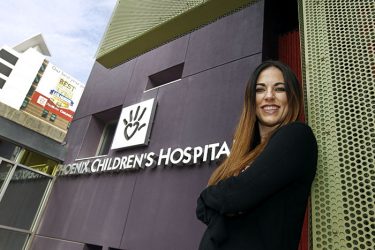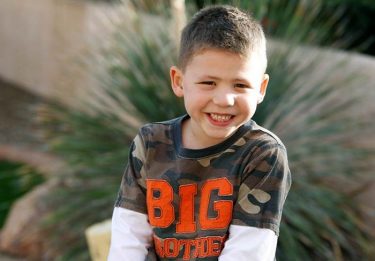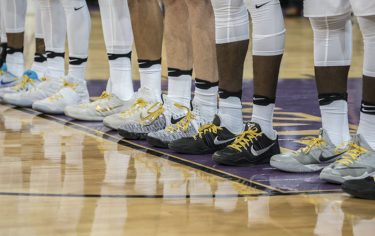Editor's note: This story is reprinted from the March issue of GCU Magazine. To view the digital version of the magazine, click here.
Story by Karen Fernau
Photos by Ralph Freso
GCU Magazine
In the last two years, 16-year-old Sedona Stewart has spent more time in hospital rooms than classrooms and has traded ballet and cello for chemotherapy and radiation.
The teenager who writes poetry and collects good luck charms from around the world is battling acute lymphoblastic leukemia (ALL).

Today, Stewart is finishing the last stage of a 2½-year treatment regimen and working to rebuild a life blown to smithereens. ALL – the most common cancer in children – took a scorching toll on both her body and mind.
To help recover emotionally, Stewart began meeting last year with Jennifer Hamblin, a part-time mental health therapist at Phoenix Children’s Hospital.
Hamblin was hired in February 2016 as the first PCH therapist to work with cancer patients and their families – and the hospital’s first position paid for with money raised by the GCU Foundation Run to Fight Children’s Cancer, scheduled for Saturday, March 11.
About the raceWhat: Seventh annual Grand Canyon University Foundation Run to Fight Children’s Cancer When: Saturday, March 11. Starting times are 7 a.m. for 10K, 7:45 a.m. 5K, 9 a.m. Cancer Survivors Walk Where: Grand Canyon University, 3300 W. Camelback Road, Phoenix Cost: $30-$45. Cancer Survivors Walk is free and open to cancer survivors. Registration: runtofightcancer.com Benefit: All proceeds from the run are spent locally by Phoenix Children’s Hospital and Children’s Cancer |
“Cancer touches the whole family. Stress, fear and so many other emotions come with diagnosis and treatment,” Hamblin said.
Children’s Cancer Network, a Chandler, Ariz.-based nonprofit that supports children with cancer and their families, earmarks its share of Run to Fight monies for the PCH therapist.
Dr. Stacy Nicholson of PCH credits the collaboration between the hospital, GCU and CCN for the much needed therapist. “Cancer is profound and devastating. We are grateful we can offer a therapist to help kids and their families deal with the shock and depression,” he said.
That’s exactly what Hamblin is doing with Stewart.
Cancer robbed the teenager who loves learning, especially about animals, medicine and women in history, of her identity.
“It was really shocking to have things change so dramatically. I lost so much of what I loved doing and the things I thought defined me,” Stewart said.
“I was struggling to figure out who I was without those things, and Jennifer helped me a lot. She helped me realize there is more to me than my academics and accomplishments. She gave me hope for the future.”
Side effects, from unrelenting nausea to radiation that scrambled her memory, forced her to drop out of Mountain Pointe High School in Phoenix and work instead toward her General Equivalency Diploma (GED).
She's learning to cook and eat new foods. She’s once again reading her beloved thrillers. In baby steps, Stewart is building her new norm.
Last year, her mother began searching for a therapist close to their Chandler home to help Stewart with cancer’s emotional roller-coaster.

“We did not have a lot of extra time or energy to travel far,” said Kristine Stewart, who quit her job as a physical therapy assistant to care for her daughter.
She ended the search after PCH doctors referred them to Hamblin, who also offers a financial respite for patients and families. There is no cost for her sessions.
As with the Stewarts, Hamblin spends her workdays encouraging childhood cancer patients and their families to be open about their feelings, from anger to panic to sadness.
Being open about feelings keeps a lid on runaway fears and fosters healing.
Cancer triggers worries ranging from survival to escalating medical bills. It forces parents to juggle the demands of hospital vigils, treatments, jobs and other children, Hamblin said.
Many struggle to understand how and why their child was hijacked by a disease that, after accidents, is the leading cause of death in children.

“Families go through a grieving process,” said Hamblin, a social worker who has experience with the families of critically ill infants, victims of sexual violence and the mentally ill.
There’s no one-size-fits-all treatment plan, and Hamblin works closely with PCH’s oncology teams to adapt her treatment to individual patients.
She uses play therapy to help young patients learn how to express their struggles and handle anger and confusion.
She helps parents unspooled by their child’s cancer prevent stress from ruining their health, urging them to eat healthy, sleep as much as possible, and exercise, even if it means doing yoga in a hospital room.
With teens, Hamblin helps patients cobble together as normal of a life as possible.
“Cancer hits the teenage patient hard,” Hamblin said. “They miss a big, important chunk of their life. They miss prom, dating and lose contact with friends. Instead of more independence, they become more dependent on their parents,” she explained.
“Their lives are turned upside down.”
She also helps teenagers keep one of cancer’s leading side effects – depression – at bay. As many as 25 percent of cancer patients develop depression, according to the American Cancer Society. That’s in contrast to about seven percent of the general population.
Stewart gives Hamblin credit for helping her keep both depression and anxiety in check.
“I’ve never been afraid of dying from cancer, but that didn’t mean I wasn’t afraid of all the pain,” Stewart said. “And there was a lot of pain. And a lot of side effects, not to mention my ongoing battles with anxiety and depression. Jennifer’s really amazing, you know.”
To Hamblin, it’s her patients who deserve the praise: “I am humbled and honored to work with all of them. They are amazing.”
Contact Karen Fernau at (602) 639-8344 or [email protected].



































































